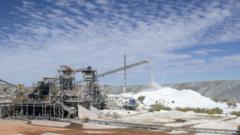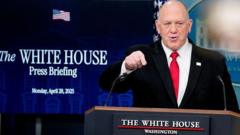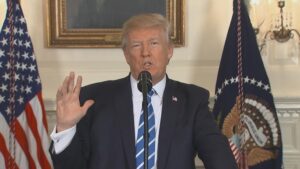Australia's Prime Minister Albanese is proposing a major investment in rare earths amidst China's export restrictions, aiming to boost local refinery capabilities and reduce dependence on Beijing for refining these essential minerals.
Australia Aims to Challenge China's Rare Earth Dominance Amid Export Restrictions

Australia Aims to Challenge China's Rare Earth Dominance Amid Export Restrictions
As China implements export limits on rare earth elements, Australia is stepping up with a significant investment in critical minerals.
Australia's Prime Minister Anthony Albanese has announced plans to invest A$1.2 billion (£580 million) in a strategic reserve for critical minerals, a move introduced as tensions rise due to China imposing restrictions on the export of seven rare earth elements crucial for cutting-edge technologies, including electric vehicles and military aircraft. These restrictions are seen as a response to the tariffs imposed by the US on Chinese imports, heightening concerns among Western governments about their dependence on China for rare earth supplies.
Rare earths, a group of 17 elements known for their difficulty in extraction and refinement, play a critical role in powering the future of technology. Australia, rich in resources like lithium and cobalt, aims to position itself as a significant player in the sector, with Albanese emphasizing that the reserve will support both domestic industries and international allies. However, 90% of rare earth refining occurs in China, raising doubts about whether Australia's new proposals can genuinely disrupt China's dominance.
The implications of China's export controls extend beyond Australia. Elon Musk, for instance, has noted that the restrictions are affecting Tesla's development of humanoid robots, illustrating broader economic repercussions. Furthermore, experts argue that while Australia is making strides with its Future Made in Australia initiative — which includes new refining projects — it is expected to continue relying on China for refining until at least 2026.
China's strategic moves in response to the evolving geopolitical climate have included critical commentary on the trade relationships between Australia and the US. Analysts perceive Albanese's proposal not just as a national benefit, but also as a strategic maneuver aimed at strengthening the position of Australia and its partners against potential adversaries like China. Economia expert Alicia García-Herrero points out that this plan is a sophisticated approach to mitigating China's control over global pricing, a crucial element given China's grip on the rare earth supply chain.
While Australia pushes to become a key supplier for the West, experts warn of potential vulnerabilities, particularly in the refining sector, highlighting that the proposed measures, though a step in the right direction, are not entirely foolproof.


















